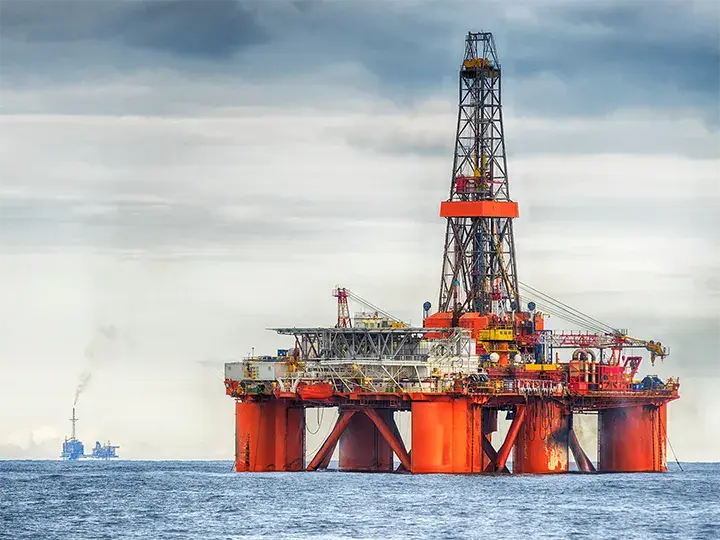HIGH PERFORMANCE OPTICAL FIBER SOLUTIONS FOR OIL & GAS APPLICATIONS
Specialty optical fibers are crucial in the oil and gas industry, offering reliable and cost-effective solutions for distributed sensing applications. With over 40 years of experience in manufacturing high-reliability optical fibers, Fibercore provides a diverse range of specialty fibers tailored for the industry's demanding environments.
WHY OPTICAL FIBER IS ESSENTIAL IN THE OIL & GAS INDUSTRY
Within the oil and gas industry, there are two main areas of use for optical fibers, firstly for sensing, and secondly for communication. Fiber optic sensors offer significant advantages over electrical sensors due to their small size, ability to operate at high temperatures, reduced risk of failure when exposed to water (or other conductive liquids) and they do not require electrical power at the sensor head.
Beyond fiber sensors, the oil and gas industry has also adopted fiber optic communication technology to allow higher bandwidth communication with the shoreline and seafloor equipment and subsequently reduce communication cable size and weight by replacing the copper cables with optical fibers.
Fiber optic sensors offer numerous advantages compared to conventional electrical sensors. Fiber optic sensors are small and lightweight enabling them to be integrated within compact cables and control lines for conveyance into oil and gas wells. Additionally, fiber optic sensors are passive in nature. This means no electrical power is required at the sensing location. And because fiber optic sensors are made from dielectric materials, they are completely immune to signal degradation caused by electromagnetic interference. Furthermore, fiber optic sensors are capable of operating in high temperatures and in harsh environmental conditions where various chemicals are present. Finally, fiber optic sensors are able to make long distance, distributed measurements all along the length of the fiber. Physical measurements of temperature, strain, and acoustics can be profiled in high definition and at a long distance away from the data acquisition unit.
Fiber optic sensing technology provides engineers with a new measurement capability to gain insights not otherwise attainable!
Fibercore's specialty optical fibers are designed to withstand harsh conditions, including extreme temperatures and corrosive environments. Their durability enables real time monitoring solutions that provide reservoir engineers with the information needed to get the most out of the well while reducing the frequency of maintenance interventions. This leads to cost savings, uninterrupted operations, and increased productivity.
With the wealth of information provided by fiber optic sensors, well operators are equipped to diagnose and pinpoint the location of trouble spots in the well. By providing real-time data on well conditions, fiber optic sensors enable operators to make informed decisions, enhancing safety protocols and operational efficiency. This proactive approach minimizes risks and optimizes resource management.
KEY BENEFITS OF FIBERCORE’S SPECIALTY OPTICAL FIBER FOR OIL & GAS
The environments in which oil and gas fiber optic sensors need to operate requires specially designed fibers to ensure long lifetimes and performance that exceeds the historic technologies. In many of the sensing application areas, a standard telecommunications fiber is not suitable. Fibercore has designed a range of specialty optical fibers specifically designed for use in the oil and gas industries.
Our specialty optical fibers are uniquely designed used for fiber optic sensing measurements in harsh environments, such as an oil well. Fibercore has extensive expertise in designing and fabricating optical fiber sensors that are uniquely suited for guiding and preserving the properties of light used in such measurements – namely amplitude, frequency, phase, and polarization. Fibercore specialty fibers for downhole sensing feature low attenuation, hermetic coatings and defect free glass composition to prevent hydrogen darkening. And with a variety of modern coating systems, the fiber optic sensor will remain protected through a wide temperature range.
Fibercore's fibers enable DAS technology to detect acoustic signals along pipelines, allowing for real-time monitoring of flow conditions and early detection of anomalies such as leaks or blockages. Furthermore, Fibercore’s eDAS fibers provide signal power enhancements that directly improve signal to noise ratio to detect weaker acoustic events with improved spatial resolution.
Our fibers are integral to seismic sensing applications, aiding in the exploration and evaluation of oil and gas reservoirs by providing accurate data on subsurface structures. Fibercore’s ultra-thin SM fibers are custom tailored for use in highly sensitive fiber optic geophones. Fibercore’s ultra-thin SM fibers are custom tailored for use in highly sensitive fiber optic geophones. The small diameter of our 50um glass optical fibers make small, highly phase sensitive, interferometric sensor packages a reality.
WHY CHOOSE FIBERCORE FOR OIL & GAS APPLICATIONS?
Industry-Leading Expertise and Innovation
With nearly four decades of experience, Fibercore leads in specialty optical fiber solutions, continually expanding our product range to meet evolving industry demands.
Proven Performance in Harsh Environments
Our fibers have a track record of reliable performance in some of the world's most demanding and complex environments, including oil and gas operations.
Customizable Optical Fiber Solutions
We offer tailored solutions to meet specific requirements, ensuring our specialty optical fibers align with your operational needs and environmental conditions.







